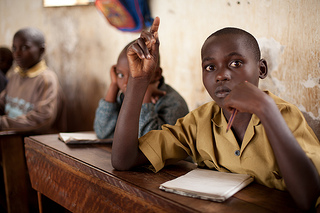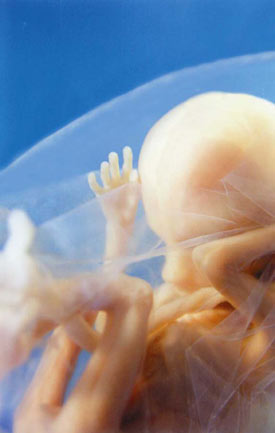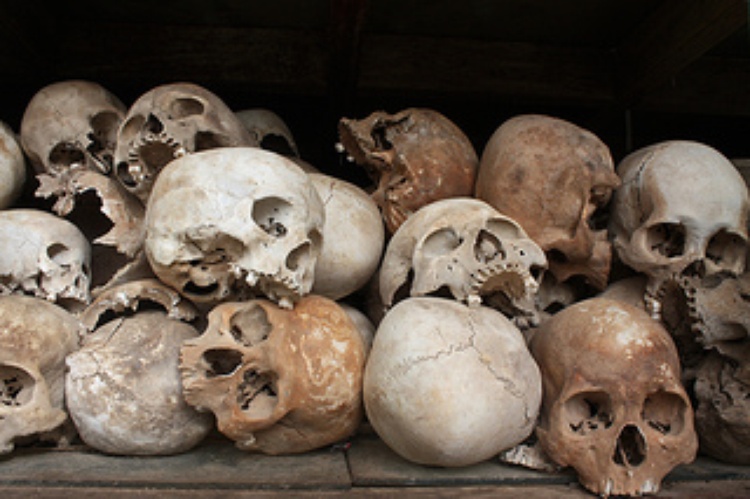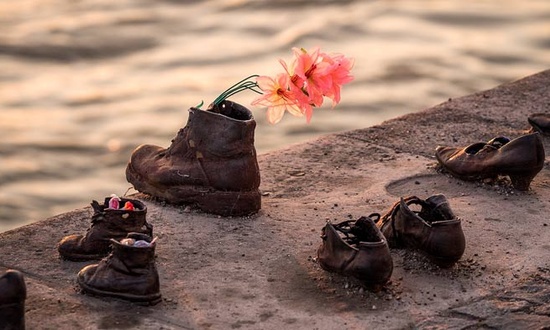I can mourn with and pray for the families in Connecticut who lost their children (and in a few cases their spouses) in the school shooting. I certainly cannot offer any definitive explanation. I am dedicating this week’s three blogs to perspectives that may be helpful to some. Keep in mind that we are treating only a few aspects of the problem of evil, and therefore much will remain unaddressed. For a larger perspective, see my books on this issue, in particular If God Is Good.
Acts of extreme evil, though routinely used as arguments against God, are actually arguments for supernaturalism.
I spent hours walking through Cambodia’s Killing Fields. Vek and Samoeun Taing, a gentle Cambodian couple who had survived there with a young child for two years, escorted our small group. Feeling numb, I saw the skulls piled up and stood by the mud pits where killers threw hundreds of bodies. A human jawbone lay at my feet. I picked it up, held it in my hand, and wept.
The darkness felt overwhelming. Pol Pot and the Khmer Rouge murdered nearly one-third of the country’s population. Yet the three million slaughtered in Cambodia amount to less than one-fiftieth of the murders by twentieth century tyrants, who killed mostly their own people. Hitler, Stalin, and Mao accounted for most of the carnage, but the ongoing state-sponsored killing in Sudan, including the Darfur region, follows the same script. (And this figure ignores the staggering number of preborn children aborted throughout the world.)
Samoeun’s parents both starved to death. One of her brothers was murdered; they never again heard from another brother. Vek’s brother and sister-in-law and six of their children all perished. We stood together at a tree where Khmer Rouge soldiers held children by their little feet, swinging them into the tree to smash their heads. Unthinkable evil! Who could imagine such horrible crimes?
I just looked again at a photograph of one sign written in Cambodian, referring to the “sea of blood and tears.” The sign reads as follows, its awkward English translation powerfully capturing the sentiment:
We are hearing the grievous voice of the victims who were beaten by Pol Pot men with canes, bamboo stumps or heads of hoes. Who were stabbed with knives or swords. We seem to be looking at the horrifying scenes and the panic-stricken faces of the people who were dying of starvation, forced labour or torture without mercy upon the skinny body.... How bitter they were when seeing their beloved children, wives, husbands, brothers or sisters were seized and tightly bound before being taken to mass grave! While they were waiting for their turn to come and share the same tragic lot.
The method of massacre which the clique of Pol Pot criminals was carried upon the innocent people of Kampuchea [Cambodia] cannot be described fully and clearly in words because the invention of this killing method was strangely cruel. So it is difficult for us to determine who they are for they have the human form but their hearts are demon’s hearts.
After all the horrors I’d learned of on that unforgettable day, human skulls at my feet, that one sentence rocked me: “They have the human form but their hearts are demon’s hearts.”
Yes! That was it. Nothing on a merely human level could explain the gratuitous torture, the tireless cruelty inflicted even on helpless children. This was superhuman evil.
 Nanci and I felt overwhelmed as we walked through the Holocaust Memorial in Washington, D.C. Years before we’d had an even more unforgettable experience at Yad Vashem, Jerusalem’s Holocaust museum. The burning candles and the reading of the names of children killed in the Holocaust remain among the most haunting and unforgettable experiences of my life. We watched sobbing men and women poring through books to find the names of their murdered relatives. What surrounded us cried out for an explanation even bigger than human depravity.
Nanci and I felt overwhelmed as we walked through the Holocaust Memorial in Washington, D.C. Years before we’d had an even more unforgettable experience at Yad Vashem, Jerusalem’s Holocaust museum. The burning candles and the reading of the names of children killed in the Holocaust remain among the most haunting and unforgettable experiences of my life. We watched sobbing men and women poring through books to find the names of their murdered relatives. What surrounded us cried out for an explanation even bigger than human depravity.
I think often of a young man I met on a plane who told me he didn’t believe in evil. When I asked him whether the Holocaust was evil, he replied, “I guess it was a mistake.” But his body language betrayed him. It was evil... and he knew it.
One test of a worldview is whether you sometimes have to borrow from another because yours doesn’t work. That’s what this young man had to do. I believe he recognized what he refused to verbalize. To admit the Holocaust was evil, he would have to abandon his worldview and borrow the concepts of both human and demonic evil from a worldview he didn’t want to believe.
Extreme evil committed by “regular” people demands a superhuman explanation.
Emmanuel Ndikumana is a Hutu married to a Tutsi. This is remarkable, since in the 1994 Rwandan slaughters, Hutu militia massacred a million Tutsis, many of them hacked to death with machetes. Tutsis then took revenge on Hutus. Teenage classmates at Emmanuel’s school targeted him for murder.
 Do you know what struck me most when Emmanuel told me of his survival? It was that the Tutsi students who tried to murder him were, in every respect, very normal young people. So were most of those Hutus who butchered innocent Tutsis. Yet the gruesome murders perpetrated by both sides transcend natural explanation—so what explanation remains but a supernatural one?
Do you know what struck me most when Emmanuel told me of his survival? It was that the Tutsi students who tried to murder him were, in every respect, very normal young people. So were most of those Hutus who butchered innocent Tutsis. Yet the gruesome murders perpetrated by both sides transcend natural explanation—so what explanation remains but a supernatural one?
And once we affirm there is supernatural evil, can we fail to recognize supernatural good? God and Satan are not equal opposites, but if there is a Satan and demons who do evil, then doesn’t it make sense that there is a God and righteous angels who do good?
Robert Lifton’s The Nazi Doctors: Medical Killing and the Psychology of Genocide documents how intelligent medical professionals participated in cruel and deadly experimental surgeries on Jewish children, with appalling ease. Among the best-trained medical personnel in Europe, they enjoyed normal family lives and loved their children and pets; but day after day, they committed shockingly cruel evils.
Susan Smith went to prison after drowning her two small sons because a man she was dating hinted that he didn’t like children. When Chuck Colson visited that prison, he heard that Smith had signed up to hear him speak. Colson looked for her in the audience but never saw her. Afterward he found out she’d been sitting right in front of him. His point? “The face of evil is frighteningly ordinary.” [1]
I’ve watched interviews with family, friends, and classmates of serial killers who all say the same chilling words: “He was such a nice boy.”
In People of the Lie, psychologist Scott Peck tells the story of Bobby, a young man suffering from depression. Bobby struggled with the recent suicide of his older brother, Stuart. His condition plummeted after Christmas.
Dr. Peck asked him what presents he’d received for Christmas. Bobby told him, “A gun.” This alarmed Peck because of Bobby’s depression, and especially since the boy’s brother had shot himself. Then came the horrifying truth: his parents gave Bobby the same gun Stuart had used to commit suicide. Bobby’s post-Christmas depression suddenly made sense. His seemingly normal parents, with their Christmas gift, had invited him to take his life like his brother had.
Satan and demons provide the most rational explanation for unnatural evil.
 In The Brothers Karamazov, Ivan cites terrible evil after evil to his Christian brother, Alyosha. He speaks of Turks nailing their prisoners by the ears to fences, only to let them suffer all night and then hang them in the morning. He says,
In The Brothers Karamazov, Ivan cites terrible evil after evil to his Christian brother, Alyosha. He speaks of Turks nailing their prisoners by the ears to fences, only to let them suffer all night and then hang them in the morning. He says,
People talk sometimes of bestial cruelty, but that’s a great injustice and insult to the beasts; a beast can never be so cruel as a man, so artistically cruel. The tiger only tears and gnaws, that’s all he can do. He would never think of nailing people by the ears, even if he were able to do it. These Turks took a pleasure in torturing children, too; cutting the unborn child from the mother’s womb, and tossing babies up in the air and catching them on the points of their bayonets before their mothers’ eyes. [2]
While Ivan considered this an argument against God, it actually provides a compelling argument against naturalism. Ivan is right. Mere animals would never do such a thing.
Ivan speaks of apparently normal people, responsible and civil to fellow adults, who delight in torturing children:
It is a peculiar characteristic of many people, this love of torturing children, and children only. To all other types of humanity these torturers behave mildly and benevolently, like cultivated and humane Europeans; but they are very fond of tormenting children.... It’s just their defenselessness that tempts the tormentor, just the angelic confidence of the child who has no refuge and no appeal, that sets his vile blood on fire. In every man, of course, a demon lies hidden—the demon of rage, the demon of lustful heat at the screams of the tortured victim, the demon of lawlessness let off the chain. [3]
Where did the ideas for such malignant evil come from? Read the Bible and C. S. Lewis’s The Screwtape Letters and you’ll discover the answer.
 Demons prompt the killing of children. The false god Molech, a demon, demanded the sacrifice of children. In the first of a dozen passages warning against this bloodthirsty demon, God says, “Do not give any of your children to be sacrificed to Molech, for you must not profane the name of your God” (Leviticus 18:2 1). God loves children, his tiniest image-bearers. Demons hate them. In killing them, demons lash out at God. It’s true of school shootings, and it’s true of abortion.
Demons prompt the killing of children. The false god Molech, a demon, demanded the sacrifice of children. In the first of a dozen passages warning against this bloodthirsty demon, God says, “Do not give any of your children to be sacrificed to Molech, for you must not profane the name of your God” (Leviticus 18:2 1). God loves children, his tiniest image-bearers. Demons hate them. In killing them, demons lash out at God. It’s true of school shootings, and it’s true of abortion.
The atheistic worldview simply cannot account for superhuman evil. Death, yes; suffering, yes. But calculated, relentless, exhausting brutality toward the weak and innocent? The death camps? The Nazi doctors? The Killing Fields? The despicable acts of apparently “normal” people such as Bobby and Stuart’s parents? Jesus gave us the answer when he said of Satan, “He was a murderer from the beginning” (John 8:44).
Three times in my life, each unexpected, I have faced the palpable presence of supernatural evil. In each case it was distinctly not of this world. Given the world’s atrocities, should it surprise us that supernatural powers can influence human beings?
After witnessing the members of Sudan’s so-called Lord’s Resistance Army force children to hack their parents to death with machetes (or be killed along with them), my friend heard one man respond, “I now believe in God, for I have met the devil.”
Extreme evil can wake us up to the reality of both good and evil, testifying to the invisible realities of God and Satan.
Unbelievers and believers both call certain things utterly evil, including child abuse. Some will cite such evil as evidence against God. But others will see things for what they are and come face to face with the supernatural. When evil grows awful enough, the unbeliever may abandon the sinking ship of moral relativism and its conviction that supernatural evil doesn’t exist.
Because the Christian worldview offers a well-grounded explanation for both human and superhuman evil, and a solid basis for moral outrage, those who find themselves morally outraged at atrocities owe themselves a careful look at it.
In the next two blogs I’ll address the question of, “Why doesn’t God prevent more evil?”
Sources
[1] Charles Colson, How Now Shall We Live? (Carol Stream, IL: Tyndale, 1999), 185.
[2] Fyodor Dostoevsky, The Brothers Karamazov (New York: Modern Library, 1995), 265.
[3] Dostoevsky, The Brothers Karamazov, 268.
Photo credits: prayer image | killing fields: istolethetv via photopin cc | Holocaust Memorial: teachandlearn via photopin cc | Rwandan boy: expressionposthumus via photopin cc | unborn child




